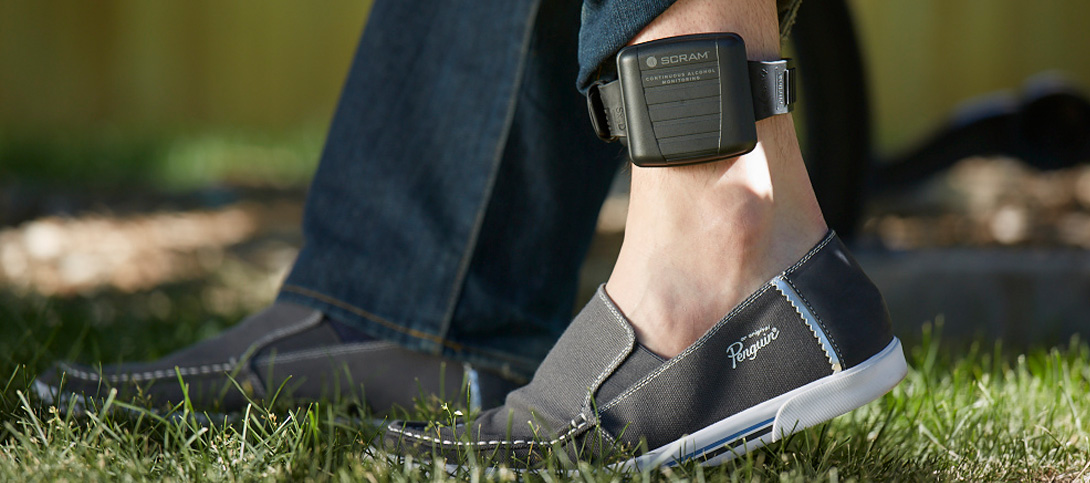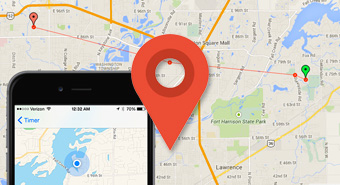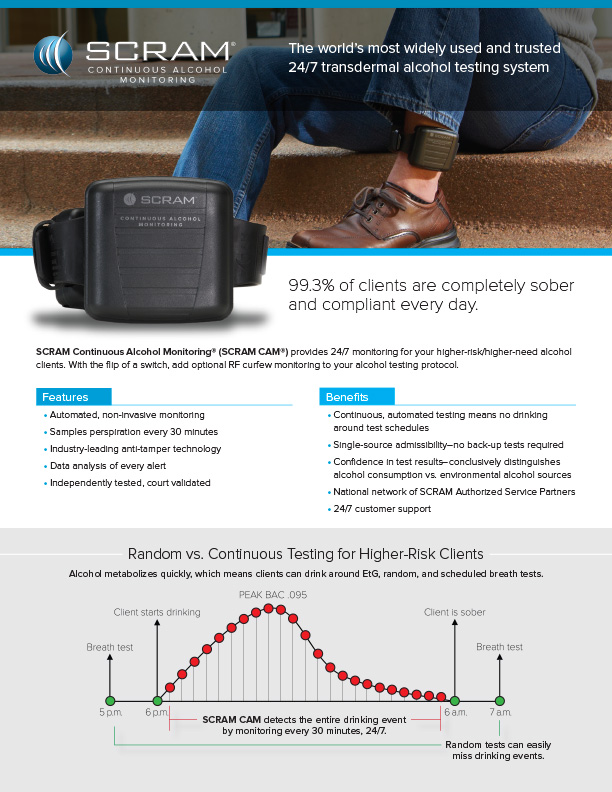
DUI Accountability and Compliance With SCRAM CAM
SCRAM Continuous Alcohol Monitoring is a bracelet that combines 24/7 transdermal alcohol testing with optional house arrest monitoring in one device. Designed for high-risk, repeat DUI, drunk driving, and other alcohol offenders in Oklahoma, the SCRAM system and program is the world’s most widely used and trusted 24/7 transdermal alcohol testing system on the market today.
- Standalone alcohol monitoring or CAM with home curfew monitoring at the flip of a switch
- Eliminates testing gaps—no ability to miss a test or drink around testing schedules
- Goes where the client goes—no transportation to a testing center
- Studies show CAM is most effective for offenders assessed with alcohol dependence or addiction
- Works well in conjunction with treatment to enforce compliance and better identify when intervention may be needed
“I had the device on for almost a year and I am so grateful that I had it on. It was like a guardian angel.”
—SCRAM CAM Participant
Benefits of SCRAM CAM
- Permits the tracking and sorting between repeat offenders and the occasional drinker
- Constant alcohol monitoring can be used on offenders accused of domestic violence, assault and battery, sex-offenders; i.e. any crime where alcohol is a contributing factor
- Demonstrates that the Court is using technology to fight a serious and recurring problem
- Helps reduce the work load on the probation/parole staff
- Demonstrates that the Court is attacking the problem and has found a middle ground between incarceration and the perception of no sanction
- Gives the judge a tool to apply when a plea bargain is presented that may not effectively protect the public
- Provides an alert capability to be used when requiring treatment and counseling
- Exceptionally strong capability provided to DUI/DRUG COURT judges dealing with those offenders needing to be rehabilitated over a long cycle
- Finally, provides to the judge knowledge of what the offender “really” does upon leaving the court room
- Requiring offenders to be constantly monitored provides an acceptable middle ground between incarceration and the perception of no sanction
- Commits the defendant to being monitored for future alcohol consumption
- Helps society by keeping family together and the offender employed
- SCRAM expenses are far less to the taxpayer than incarceration
- Alerting the press and public to the use of constant alcohol monitoring can generate considerable support
- Agreeing to wear the monitoring bracelet can keep the client out of jail/prison
- Shows a willingness that the client is prepared to take on their drinking problem
- Gives the attorney a “positive alternative” when negotiating for a client
- Provides a forceful argument in seeking a better deal for indigent clients
- Enables the public defender to finally have a way to attack alcohol dependence
- Keeps the indigent out of jail and the public can still receive protection
- SCRAM monitoring is a better opportunity for the offender’s family
- Provides 24/7 assessment of offender
- Can separate problem drinkers from the unlucky sort
- Passive system for actively monitoring offenders
- Assists probation/parole reduce the burden of a heavy case load
- Guards against false positives
- Officers can view reports from any location
- Increases officers safety and efficiency; no need to drive by offender’s home or work to check and/or collect samples
- Provides effective monitoring of offenders in remote areas; especially helpful for officers covering large geographical areas where day reporting centers, house calls, etc are not available
- Drinking events are not missed; and random testing is not added to officers case load
- Based on offender types (habitual drinker, domestic violence, sex offender, etc) the bracelet can alert officers as to when more specific rules need to be applied
- Provides a positive sense that finally something can be done about habitual drinkers
- Stops the “manipulative” alcohol-related offender
- Applies the “best possible” technology to attack the problems created by alcohol abuse and dependence
- Cuts down the need to hire more staff and applies technology as a force multiplier
- Ability to maintain “normal” daily routine
- Knowledge that they are always being monitored may influence behavior
- They retain mobility
- Alternative to incarceration
- Guards against false positives
- Keeps family structure together
- Employment can be maintained
- Provides assistance to offender in breaking alcohol habit






